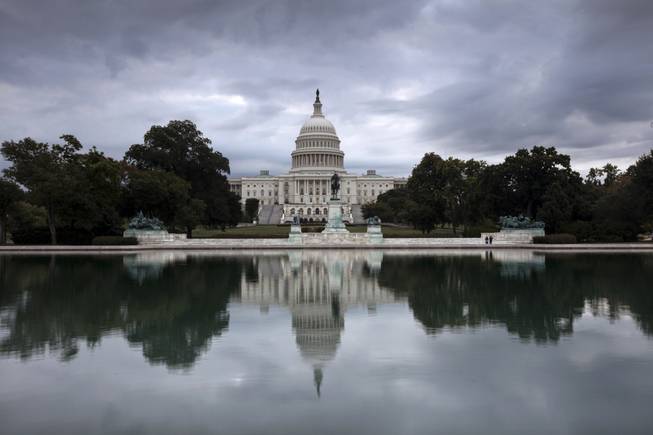
J. Scott Applewhite / AP
Storm clouds hang over Capitol Hill in Washington in this Friday, Sept. 27, 2013, file photo.
Thursday, July 3, 2014 | 2 a.m.
It’s America’s birthday week, but the country’s most recognizable landmark is empty.
The marbled halls of Congress, normally bustling with striding, suited lawmakers and their harried aides, are silent this Fourth of July week. All that remain are a few tour groups and much-calmer-looking staffers in jeans.
“I like it this way,” said a Capitol Hill police officer guarding a darkened Senate chamber.
Members of Congress are back in their home states marching in parades and shaking hands at barbecues for the Fourth of July recess. The weeklong holiday is a congressional tradition that dates back decades, but what’s a relatively new phenomenon is how little time lawmakers spend in Washington, D.C., the rest of the year.
In the 1970s and '80s, lawmakers had a similar work schedule to the rest of us. The Senate was in session Monday through Friday and for most days a year, said official Senate Historian Donald Ritchie.
“Some members came in on Saturdays, even if the Senate wasn’t in session,” Ritchie said.
But for a variety of reasons, lawmakers’ workweek has shortened dramatically.
For the past few years, lawmakers have spent an average of three days a week on Capitol Hill and roughly one-third of the year in session, according to a 2013 CNN analysis.
Ironically, the shortened workweek in D.C. could be a result of greater pressures on lawmakers.
In the 1970s, lawmakers would move their families to D.C. and travel home just two or three times a year, Ritchie said. Today, a politician who does that risks being labeled “a Washington insider.” So members often spend Mondays and Fridays traveling to and from their districts — even the ones who live as far away as Hawaii — and scrunch their legislative week into three days.
“I’ve actually heard senators, when they come back from the recess, the conversation is often about, ‘How do you commute? How many flights do you have to get on?’” Ritchie said. “They spend so much time in transit.”
Makings matters worse, two recent Supreme Court rulings that changed how lawmakers raise campaign money mean lawmakers now must spend even more time fundraising with folks back home, Ritchie said.
The shortened week and increased travel has a detrimental effect on morale, insiders agree. Former Sen. Richard Bryan, a Democrat who represented Nevada in the '90s, said he thinks lawmakers don’t get a chance to build relationships with their colleagues, perhaps missing key opportunities to find bipartisanship and compromise.
“You see members, but you don’t really know a lot about their personal interests,” Bryan said. “You know their positions on various bills, might have met their spouse, but you really did not or do not get to know them.”
Congress’ legislative calendar isn’t likely to change anytime soon, which means you’re just as likely to find eighth-grade field trips striding through the halls of Congress as you are lawmakers.

Join the Discussion:
Check this out for a full explanation of our conversion to the LiveFyre commenting system and instructions on how to sign up for an account.
Full comments policy